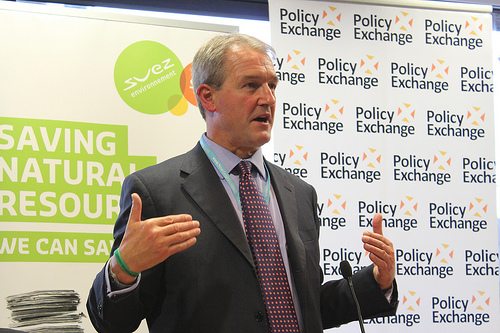

Environment
The Secret Environmentalist: Exit, pursued by a (Green) Blob
Poor Owen Patterson, he’s not exactly Steve McQueen. Like Steve, Owen was (or felt) attacked by a blob, his borrowed term for the environmental movement; a mix of NGOs, lobbying organisations and other environmental interest groups. The erstwhile UK environment secretary apparently felt besieged by a well-funded, coordinated machine.
However, most of us inside it would struggle to recognise our sector as such – it will be more familiar to us as a dis-organised, poorly funded rag bag of environmental types riven with internecine conflicts, petty jealousies and clashing egos.
Unlike Steve McQueen however, Owen’s heroism in fighting the green blob is less clear to the observer…perhaps he will find his place in history as the champion of the downtreaders, Galt like hero of the overlords.
It must be tough being environment secretary, especially when your acceptance of the basics of science is tenuous and your belief in the free market means that noting its inadequacies for preserving our life support systems is tantamount to apostasy.
Owen’s complaints about the green blob feed in to a regular (if tedious) mantra; that environmental groups are well (lavishly!) funded, self-serving and single issue. Let’s examine these one-by-one.
Are environmental groups well-funded?
Well, it depends what you are comparing them to. Some environmental NGOs (ENGOs) are reasonably comfortable, some have shiny landmark offices and attract and disperse funds of many millions a year. This seems like a lot, but it isn’t really when compared to the budgets of groups seeking to pursue a less pro-environment agenda. Such budgets are not merely those specifically earmarked for lobbying to affect, arrest or to design legislation and massage public opinion. The true equivalent to an ENGO’s turnover is the annual turnover of a consumption promoting company (and let’s face it, they are pretty much all engaged in that – growth is the only signifier of success in our modern markets – and growth equals increased consumption).
ENGO’s turnover, even the biggest, tend to be in the low multi millions, perhaps around 100 to 150 million. Corporates have turnover in the multi billions. When it comes to gaining the ear of politicians and policy makers, who is the best funded and best placed?
Are environmental groups self-serving?
Well, strangely enough they probably are self-serving, but so what? They tend to work to deliver action within their Articles of Association and in the interests of their members and their mission. That sounds remarkably like any corporation or private company you care to mention. Like any organisation, environmental NGOs try to undertake activities that have tangible demand, are fundable and have a connection to their purpose. You wouldn’t call a company on a trading estate in Luton selling electrical components self-serving, why should you do so to an organisation raising and spending money on conserving endangered species?
The single issue issue
All organisations have a purpose – does a focus upon the delivery of that through a strategy make them single issue? Big biotech is single issue when viewed through this lens – in Owen’s many meetings with their friendly representatives, did he castigate them for not making furniture or installing double glazing too?
Lots of corporate entities in our modern world are single issue; any private institution is literally single issue – interested in and encouraged to maximise capital, you can’t get more single issue than that!
Most environmental groups aren’t even single issue anyway – those mature enough to acknowledge the fundamental interconnectedness of things actually seek to create sustainable, equitable change on a number of levels.
In any case, why should an organisation having a clear and defined focus for its activities be seen as a problem, or render them dubious or suspicious?
Going Native
It is a strange and notable fact that, over the years, many UK environment secretaries have “gone native”, examples are considered to be Lord Deben and Michael Meacher.
Once in place for a period of time, they start to actually understand and represent the interests of the environment – straying from party ideology and dogma to what approaches a nuanced understanding and representation of environmental issues.
Why this happens is probably quite obvious, anyone who looks at environmental trends and their implications for our continued security and quality of life over the next few decades finds it hard to ignore the fact that environmental concern is not about sentiment but about survival. It is difficult to unlearn what you have learnt, difficult to un-see what you have seen.
Of course, this is not a problem if you aren’t there to learn in the first place and are wilfully blind to the fact that we need to find ways to live on our single planet that do not innately give rise to problems we are ill equipped and unprepared to deal with.
The wrong peg in the wrong hole
Of course, the outgoing minister’s problem might not have been that he really meant all those epithets, or even that he was publically outwitted by large (self-serving) Mustelids. It might be simply that he was put in a job that he really wasn’t suited to by a prime minister who seems to have a functional disregard for maintaining the quality and quantity of the UK’s social and ecological infrastructure.
Mr Paterson, like so many of his colleagues, was not really made for or interested in a world of complexity, a world where properties emerge from intricacy in unexpected ways, a world where the side-effects of an action may be much, much worse than the problem that it was originally designed to treat.
Of course the former minister may not get his fritillaries mixed up – but he is certainly part of a government seemingly hell bent on consigning fritillaries of all stripe and type to the (natural) history books.
May he go well and go fruitfully unto speaking engagements, his time in the lime-green light over for now. We have work to do even as he exits stage left (pursued by a blob), we must gird our loins to meet the fresh face entering stage right (wing), the next ideologue hot off the political production line.
“The Secret Environmentalist has been in the business for more than two decades and has worked at all levels of sustainability. S/he has ranged from the chalk-face of kids education and the coal-face of small business support to the nightmare of drinking coffee in some of shiniest boardrooms on the planet. Experienced in the real world of the private sector and the realer one of not-for profits, the Secret Environmentalist is mad as hell, and is not going to take this anymore.”
Further reading:
The Secret Environmentalist: tell me something I don’t know
The Secret Environmentalist: things are changing but sustainability is still a pipedream
The Secret Environmentalist: all out for shale gas
Our insane civilisation lacks the wisdom to deal with the problems we face
Climate change: the time has come to become unreasonable






























